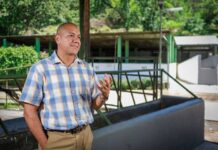Concerned about the rising levels of drug resistance whereby microbes evolve to become immune to a known drugs, the UK Prime Minister asked economist Jim O%u2019Neill to analyse this global problem of antimicrobial resistance (AMR) and propose concrete actions to tackle it internationally.
In July 2014, the UK Government commissioned the Review on Antimicrobial Resistance in collaboration with the Wellcome Trust. The Review is independent and engages widely with international stakeholders to understand and propose solutions to the problem of antimicrobial resistance, from an economic and social perspective. In May 2015, Jim O%u2019Neill, who is widely known for coining the term BRICs for the emerging economies of Brazil, Russia, India and China, was appointed to the House of Lords and became Commercial Secretary to Her Majesty%u2019s Treasury in the UK. He continues to chair the Review on Antimicrobial Resistance in a personal capacity.
If we fail to act, we are looking at an almost unthinkable scenario where antibiotics no longer work and we are cast back into the dark ages of medicine’ %u2013 David Cameron, UK Prime Minister
The real implications of spreading drug resistance will be felt the world over, with developing countries and large emerging nations bearing the brunt of this problem. Routine surgeries and minor infections will become life- threatening once again and the hard won victories against infectious diseases of the last fifty years will be jeopardized. Hospital stays and expenses, for both public health care providers and for out of %u2013pocket payers will increase significantly. Drug resistant infections are already on the rise with numbers suggesting that up to 50,000 lives are lost each year to antibiotic-resistant infections in Europe and the US alone. Globally, at least 700,000 die each year of drug resistance in illnesses such as bacterial infections, malaria, HIV/Aids or tuberculosis.
The Review on AMR has been assessing solutions to avoid these terrible costs, producing thematic papers looking at all aspects of the problems raised by drug resistance %u2013 including the supply of new drugs, the use of diagnostics, surveillance, infection control, alternative treatments and the use of antibiotics in agriculture. These themes will form the basis of the final report to the UK Prime Minister, with recommendations for global solutions, by the summer of 2016.
We have reached a critical point and must act now on a global scale to slow down antimicrobial resistance%u201D %u2013 Professor Dame Sally Davies, UK Chief Medical Officer
NEW %u2013 January 21, 2016. Major declaration by pharmaceutical industry on combating antimicrobial resistance launched to coincide with World Economic Forum (WEF) in Davos.
May 19, 2016 %u2013 Tackling Drug-Resistant Infections Globally: final report and recommendations
This report outlines the Review%u2019s final recommendations. It first discusses the mounting problem of resistance and why action is needed to combat it and then provides an overview of the solutions that the Review thinks should be implemented to curtail unnecessary use and increase the supply of new antimicrobials. It then looks at the role of public awareness campaigns, the need to improve sanitation and hygiene, reduce pollution from agriculture and the environment, improve global surveillance, introduce rapid diagnostics and vaccines, the need to increase the number of people in this area, and use of market entry rewards and an innovation fund to generate more drugs. Finally the paper examines how these solutions can be funded and looks at ways to build political consensus around them.
Supporting Documents
Commissioned study by Dr. Nimalan Arinaminpathy the impact of diagnostics and new treatments against TB main report.
Commissioned study by the Foundation for Innovative New Diagnostics (FIND), into the future of TB diagnostics main report.
Commissioned paper by ReAct-Action on Antibiotic Resistance Strategic Policy Program and Center for a Livable Future in the Department of Environmental Health Sciences, Johns Hopkins Bloomberg School of Public Health main report.
Commissioned study by Katy Turner et al. into the impact of rapid diagnostics against gonorrhea main report and the model used.
Study by LSE Master%u2019s in Public Administration students on the cost and benefit of WASH interventions in Brazil, India, Nigeria and Indonesia main report.
Commissioned study by NIHR Diagnostic Evidence Cooperative Oxford, into the future of diagnostics for antimicrobials main report.
Commissioned study by Pierre Nouvellet et al. into the impact of new drugs and better diagnostics in the treatment of E. Coli main report.
Translations of the introduction and executive summary are available in the following languages; Arabic, Chinese, French, Japanese, Portugese and Spanish.



























































